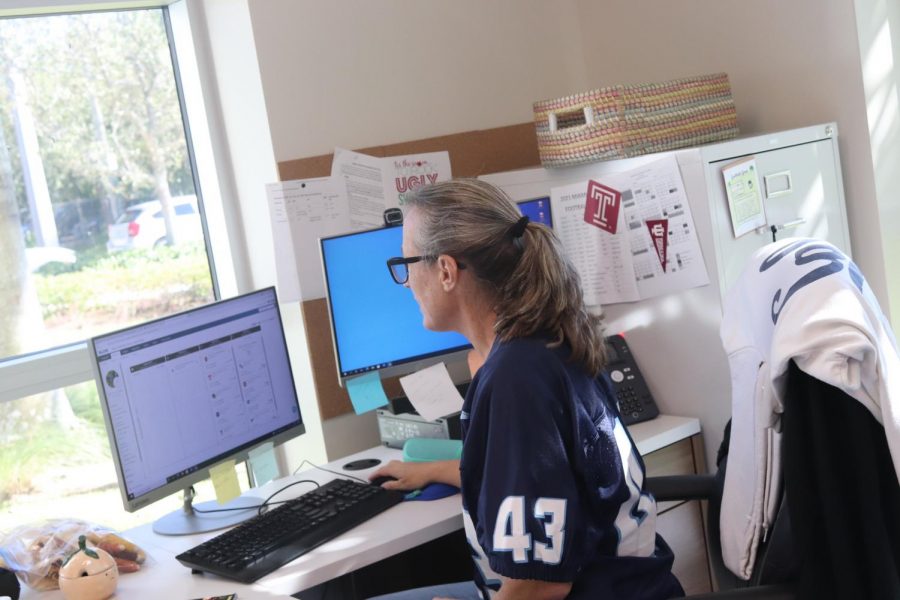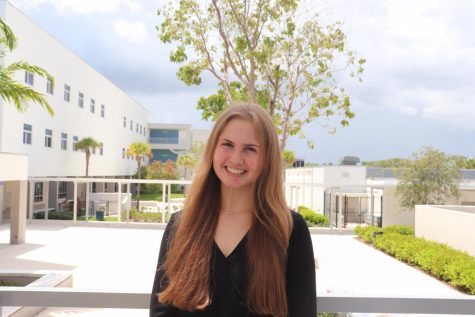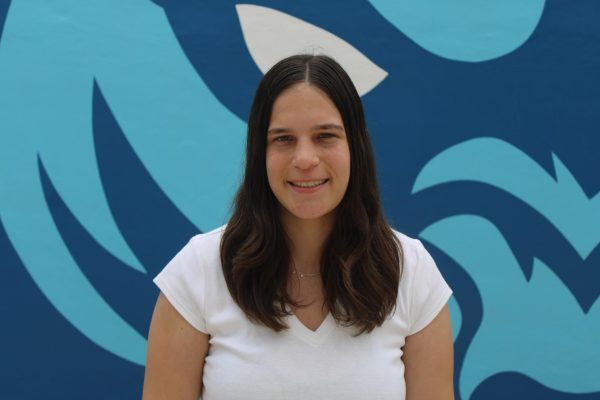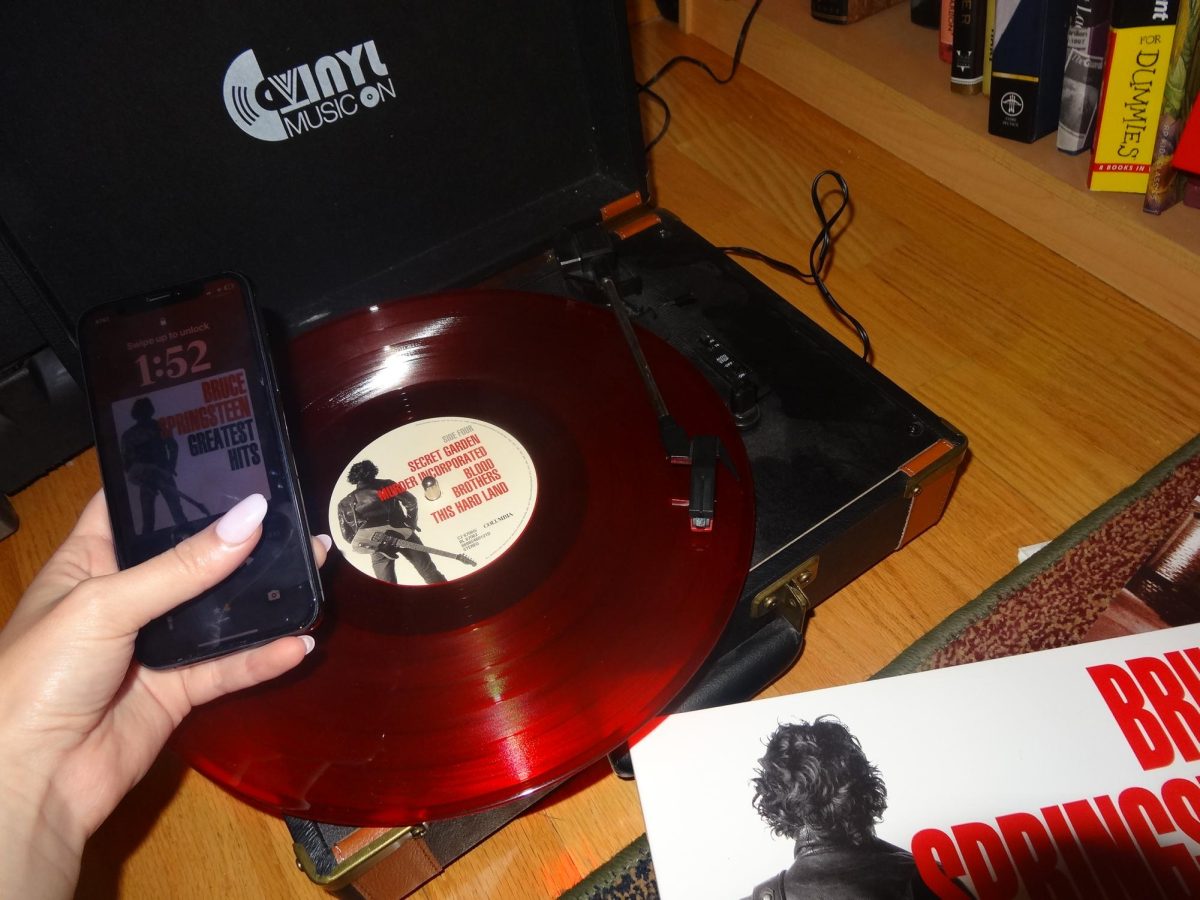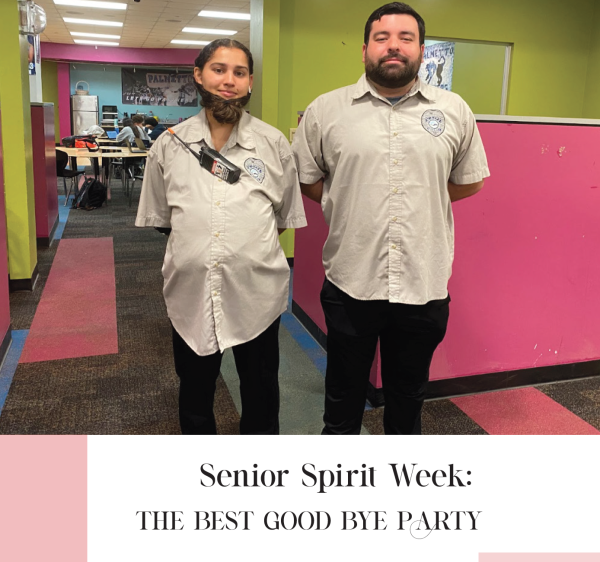Inside the Room Where it Happens: The CAP Office
Linda Dwyer, Palmetto’s CAP counselor viewing SCOIR.
November 30, 2021
Every year, seniors at Miami Palmetto Senior High School submit applications to colleges and universities around the state, country and world. Completing countless hours worth of essays, supplemental questions, resumes, college entrance exam lessons and tests, many have marveled at how students navigate the lengthy and often confusing process. The answer? The Miami-Dade County Public School’s College Assistance Program.
Founded by former M-DCPS Board Member G. Holmes Braddock in 1977, CAP began as a program of 10-12 part-time college assistant professionals, which expanded into CAP, Inc. Designed to assist students in their search for scholarships and financial aid, the program has assisted over 15,000 students in securing nearly $14,000,000 since its inception.
CAP as a program, however, has grown in its mission and direction. Students across the district also benefit from the counseling and support services that CAP advisors offer. At Palmetto, students receive assistance from Linda Dwyer, Palmetto’s CAP counselor, who trained under former CAP counselor Harry Nerenberg. Dwyer, who inherited her role amid the COVID-19 pandemic in smoothness and stride, is motivated by a singular mission.
“We have to help all 700 seniors figure out what they are going to do. Communication is key. This year, in particular, all the students were out for a year and a half,” Dwyer said. “We had to really retrain everyone on a whole new vocabulary… There was a lot of training and teaching this year.”
In order to train and teach all students at Palmetto, every student, at one point or another, matriculates into the CAP Office. Located in the attendance office, the inviting candy bowl sitting next to the doorway tempts students into the glass office. Complete with ample room to sit, calming music, a couch, access to computers and stuffed animals, students have a place to discuss, research and complete college applications.
Starting the college application process itself can feel overwhelming for some seniors. Some students, like Palmetto senior and college applicant Nicole Quintela, began to compile a long list of schools and then began to review their options in accordance with a set of “must-haves,” aspects of a university that a student cannot go without.
“In the beginning, it was a very long list of, like, 20 schools, and then I went through a process of just narrowing everything down based on my interests and where I felt I would fit the best. I narrowed it down to a list of eight schools where I think I am going to be able to grow the most and learn about my interests the most [and] that gives me the freedom to grow and expand my mind,” Quintela said.
This list of “must-haves” widely differs between each student. Depending on a student’s circumstances, interests, lifestyles or cultural background, each student can find a school and groups on campus which cater to them and their “must-haves.”
“My must-haves in applying to schools were that I wanted a collaborative environment; I did not want a competitive environment. I wanted a school whose grading system was an accurate depiction of the work that students put in… The other thing that I was adamant about was that I did not want to go to a school with a million core requirements,” Palmetto senior and college applicant Daniel Solomon said. “The other thing for me was Jewish life on campus and the presence of campus arts programs that you did not necessarily have to be an arts major to have the ability to be in.”
Certain students, like Palmetto senior and college applicant Lacey Buchwald, take the time and visit schools prior to applying to have a feel for the kind of environment they would like during their college years.
“When we started touring colleges over the summer, I found really quickly that I like a smaller atmosphere better, a more manageable campus,” Buchwald said. “It’s not like I have to have a football team or the traditional college experience of going tailgating… As long as I am getting a good education and I can have fun, I’ll be happy with that.”
Many of Palmetto’s students also look for schools that champion accessibility, inclusion, diversity and a whole host of other factors. If a student requires services that a school does not offer, it may lead them to apply at another school instead.
“Going into the college application process, I looked at the same factors that a lot of my friends and peers looked into, but I also prioritize the accessibility factor above all else. So that sort of factor of accessibility for me was more of a vetting factor. It was, ‘Is the school accessible?’ and if so, proceed. I ended up making an initial list of about 20 different schools, but had to take off about eight of them because of their inaccessibility,” Solomon said.
Another aspect of the selection process is finances. Living in the state of Florida, students who are Florida residents have the option to receive in-state tuition prices, which are comparably lower than out-of-state ones. Some students may also have a Florida Prepaid College Plan, which can either cover their tuition expenses or both tuition and room-and-board expenses.
“My parents wanted me to apply to Florida schools because that is what we can pay for. So, I applied to all the main Florida schools like FSU, UCF, etc.. But my dream schools, like a lot of them, are out of state… But because it is so much money going out of state, that is something that has restricted me,” Palmetto senior and college applicant Imani Mitchell said. “It’s so common. I have so many friends who are in the same position like me. They want to go out of state, but they get their FAFSA back and they’re like, your family contribution is $40,000. Nobody has that.”
The FAFSA, known as the Free Application for Federal Student Aid, is used as a metric by universities across the country to establish the estimated cost of attendance for a student. This determines things like expected family contribution, need-based aid, work-study programs and a whole host of other variables that are used to calculate how much a specific student and their family must pay to attend a specific university.
“I want to see the world. I want to study in different places and get to know different cultures in the academic setting. Of course, the financial aspect is big. But I understand that I’m going to have to make the sacrifice if I want to go to those type of schools. That’s something I’m going to work on,” Quintela said.
As seniors have just passed the Nov. 1 deadline for Early Decision and Early Action applications to numerous Florida state schools, many of Palmetto’s seniors have submitted at least one or more college applications. Having begun this process and completed the different aspects of the application, many students have taken varied approaches to this journey.
“It’s been a process. Personally, I’m not the best test-taker, so the whole SAT/ACT thing was like studying for and making sure I got a good enough score. Even though now it’s test optional, I still wanted to improve my score and make sure I had a score that reflected me and who I am as a student. It was difficult,” Quintela said. “I wouldn’t say it was the most difficult aspect because it’s been a four year process of just working on everything. But, when it came down to the Nov. 1 deadline for applications, it was just kind of stressful, filling all the essays out and just trying to make sure that it incorporated my personality well.”
College applications can be a source of frustration, difficulty and can create negative feelings. Comparison is something that many students, including seniors, often deal with — especially during college application season.
“I’m very fortunate to be happy with my [SAT/ACT] scores. I was happy with them during the summer, so that was already something lifted off my shoulders and I didn’t have to worry about that going into the school year. But everything else has been really overwhelming,” Buchwald said. “There’s always this fear that I’m doing something wrong and like, ‘Should your resume be one or two pages?’ ‘Should you say this in your essays?’ ‘Is it too risky to say or is it not risky enough?’ ‘Do I have a good story for my essay; how does it compare to other people?’ All of that has been very overwhelming. I feel like everyone is doing it better than I am and I know that’s probably not true because everyone’s going through the same thing. But I always have that fear in me that there’s something I’m doing wrong here and then I’m not going to get in.”
College applications, especially the writing portions, also gave students the opportunity to reflect on their lived experiences. Applicants took the opportunity to write about things that weighed heavy on their hearts and minds, taking note of how societal and cultural changes shaped them as individuals.
“I actually wrote my college essay about this, but it was not my biggest obstacle. I know for sure it’s a shared experience amongst other Black teenagers my age. As [someone] who is Black, young and female in AP classes… I’m one of the only Black students in all my AP classes. I wrote about how in 2020 there were all these crazy things happening… and how those specific movements, while they’re happening, psychologically affect the minds of Black students and teachers don’t take that into account during the school year and how that may affect their students’ work performance,” Mitchell said.
In learning about the various application pathways, the process can seem daunting and confusing. However, the student services department and CAP remain ready and able to assist students step-by-step. Throughout the beginning of the school year, Dwyer hosts college visits where students have the opportunity to interact with college representatives from institutions across the globe. In these sessions, students learn more about schools and ask questions about a school’s offerings. Students are also given the opportunity to obtain information about top institutions at the college fair, which Dwyer organizes with the support of Palmetto’s PTSA.
Beyond that, Dwyer also offers various opportunities for students to speak with her. During office hours, which take place during school hours, students have the opportunity to sit in a one-on-one session with Dwyer and discuss their high school and postgraduate plans. Arriving at school at 6:30 a.m., students can also pass by the CAP Office before the start of the school day with any questions they may have. The college application process is not only contingent on the work put into the application itself, but also the work which comes beforehand. As a result, Dwyer encourages all high school students — especially juniors — to begin thinking and working towards their post-secondary dreams.
“Juniors really need to work on their grades; grades are the most important thing. Juniors need to know that their freshman, sophomore and junior grades are what counts for that application. They apply with their senior schedule, not their senior grades on that application,” Dwyer said. “And they need to do something. Every junior needs to know how they’re going to share with the colleges how they spend their time. It is different for everyone. Someone might work, someone might love taking dual enrollment classes, someone might play soccer 24/7. Every junior is unique. But, they have to come up with something other than playing video games.”



